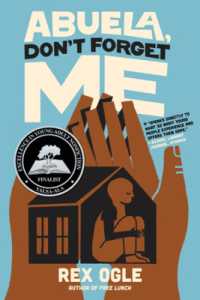基本説明
New in paperback. Hardcover was published in 2007. Chomskyan theory is compared to Post-Bloomfieldian linguistics, Lexical-Functional Grammar, Generalized Phrase Structure Grammar and Montague Grammar, and Head-Driven Phrase Structure Grammar. Finally, this book addresses the relevance of the research programme of Chomskyan linguistics for the practical study of the acquisition, change and use of language.
Full Description
Noam Chomsky is not only one of the most influential, but also one of the most controversial figures in 20th century linguistics. In view of the polarization of opinions on Chomsky, giving a balanced account of Chomskyan linguistics is an ambitious venture. The approach chosen here is to describe both Chomskyan linguistics and the positions defended by its opponents in terms of research programmes. A research programme consists of a number of assumptions on what language is and how it should be studied. Only by assuming that research programmes adopted by a large number of scholars for a prolonged period have to be rational, coherent systems can we hope to fully understand the nature of the conflicts between them. After a general discussion of the notion of research programme, it is shown how the various stages of Chomskyan theory can be analysed as belonging to a single, coherent research programme. This research programme is then compared to the ones for Post-Bloomfieldian linguistics, Lexical-Functional Grammar, Generalized Phrase Structure Grammar and Montague Grammar, and Head-Driven Phrase Structure Grammar.
Finally the relevance of the research programme of Chomskyan linguistics for the practical study of the acquisition, change, and use of language is addressed.
Contents
Introduction 1. Research programmes 1.1. The Empirical Cycle 1.2. Paradigms and Research Programmes 1.3. Truth, Progress, and Revolutions 1.4. Research Programmes in Linguistics Summary of Main Points 2. The Research Programme of Chomskyan Linguistics 2.1. Chomskyan Linguistics and Generative Grammar 2.2. Data and Grammars 2.3. Linguistic Universals 2.4. The Unity of the Research Programme of Chomskyan Linguistics Summary of Main Points 3. The Chomskyan Revolution 3.1. The Research Programme of Post-Bloomfieldian Linguistics 3.2. Continuity and Discontinuity in the Transition 3.3. Has There Been a Chomskyan Revolution? Summary of Main Points 4. Modern Competitors 4.1. Lexical-Functional Grammar 4.2. Generalized Phrase Structure Grammar and Montague Grammar 4.3. Head-Driven Phrase Structure Grammar Summary of Main Points 5. Aspects of Language Use and Development in Chomskyan Linguistics 5.1. Standard Languages 5.2. Empirical Aspects of First Language Acquisition 5.3. Language Change 5.4. Interlanguage and Second Language Acquisition 5.5. Language and Communication Summary of Main Points Conclusion







